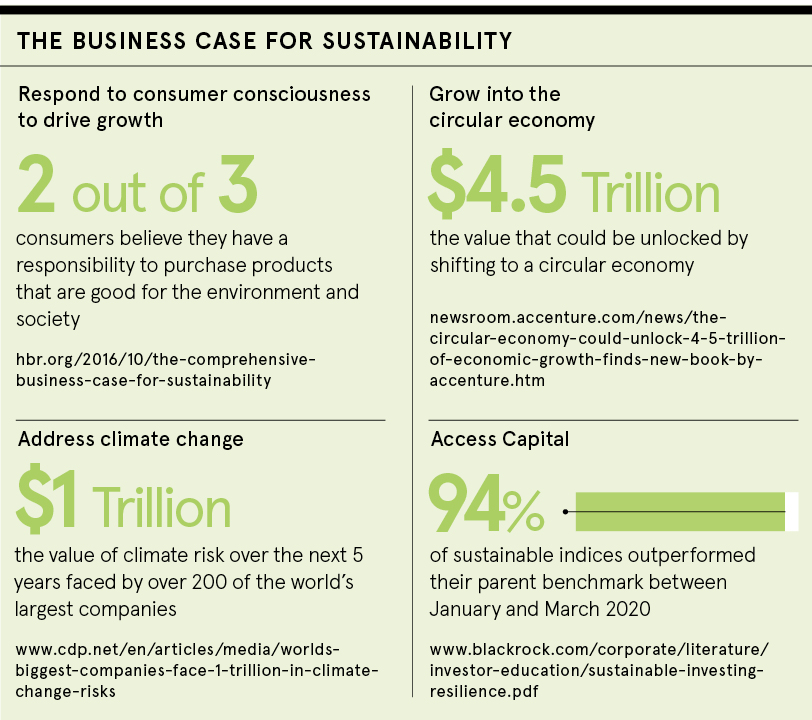Responding to the coronavirus pandemic may have occupied the most attention of boards and executives over the last 12 months, but beneath the surface another issue has arisen, which may have longer-term ramifications: sustainability.
Sustainability has moved from being something tucked away in a corner, separate from mainstream business, to being embedded at the business core, both strategically and operationally.
The investor-led environmental, social and governance (ESG) agenda has partly fuelled the financial aspects of this transition, but customers, employees and communities have also been a consistent and loud driving force demanding change. Increasingly, consumers want to purchase from organisations that align with their values and with sustainable practices baked in.
If you’re not a sustainable business across your entire value chain, your reputation, customer service, employee engagement and supply chain are all at risk
Meanwhile, the pandemic has shown the extent to which supply chains can be disrupted by external events. Natural disasters triggered through historic changes in climate, including fires, floods and storms, pose an existential threat companies can’t ignore.
The rise of sustainability is also being driven by the need to reduce waste across supply chains, requiring businesses to redefine product design, manufacture and management for reusability and new value creation. And brands must be proactive in safeguarding human rights and values, and driving equality across their workforce and stakeholders.
“Whether it’s attracting investments, keeping up with customer and staff expectations, preparing for supply chain disruptions or factoring in new risks, it’s clear sustainability is simply no longer just a nice to have,” says Vivek Bapat, senior vice president of marketing at SAP.
“If you’re not a sustainable business across your entire value chain, your reputation, customer service, employee engagement and supply chain are all at risk. It’s absolutely vital and urgent to build resiliency, agility and flexibility into processes to future-proof your organisation.”
Businesses have traditionally focused on the top and bottom lines of the profit and loss account. But sustainability warrants a new focus: the green line, integrating non-financial metrics into conventional reporting. With visibility of this new value metric only growing, there is an opportunity to make sustainability profitable and profitability sustainable.

Sustainability is not a destination, but a journey of three stages, starting with mitigating risk and better preparing for forthcoming regulations. This requires data across the business and value chain to be seamlessly brought together into a single data-intensive, multi-dimensional network, to increase the visibility of material flow and usage, carbon emissions, and humanitarian and social aspects affecting the communities the organisation operates in.
Next, the visibility can be converted into an organisation’s core business processes to unlock new sources of efficiency and productivity. And thirdly, sustainability can catalyse differentiation, business model innovation and disruptive growth.
“There is unprecedented opportunity to create new products and services for socially conscious consumers, while the green line can substantially improve the bottom line too,” says Bapat. “This trifecta allows companies to make sustainability profitable and, when they are part of the mainstream business, then profitability becomes sustainable.”
Companies can’t improve what they can’t measure or report on regulatory compliance without data. As a software platform behind 88 per cent of the world’s supply chains, touching 77 per cent of financial transaction revenues, SAP is uniquely placed to help companies better combine and gain insights from financial and non-financial metrics.
SAP’s support falls in three key areas, starting with enabling visibility of disaggregated data for compliance, ESG reporting, holistic steering and supply chain transparency.
perational excellence comes from embedding sustainability into the business core to drive efficiency and productivity. Finally, SAP is the IT foundation for innovative new business models and value propositions for customers, employees and stakeholders.
“Sustainability is the transformation agenda for companies today,” says Bapat. “Many are making bold statements about their sustainability objectives, but need enabling technologies to make sustainability profitable. SAP has the depth, relevance and reach to help them become the intelligent, sustainable enterprises of tomorrow. Through a combination of compliance, operational excellence, innovation and growth, best-in-class companies will emerge from this to become dominant forces in their industries.”
For more information please visit SAP.com and attend the virtual SAP Sustainability Summit April 28-29
Promoted by SAP

